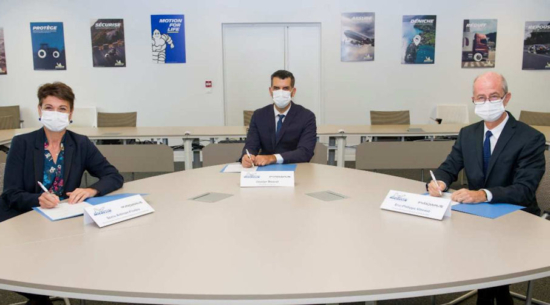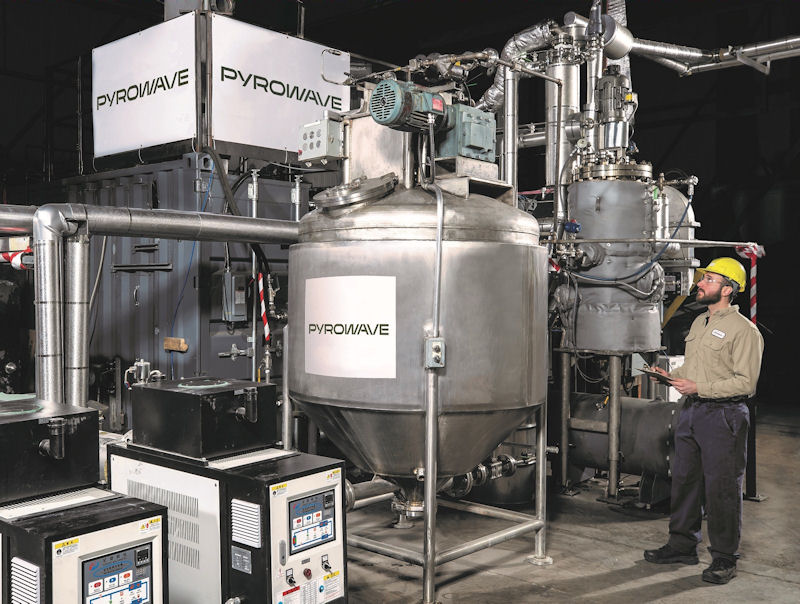Michelin-Pyrowave agreement brings tyres made with recycled plastics a step closer
 The agreement was signed by (l-r) Sonia Artinian-Fredou (Michelin), Jocelyn Doucet (Pyrowave) & Eric Philippe Vinesse (Michelin)
The agreement was signed by (l-r) Sonia Artinian-Fredou (Michelin), Jocelyn Doucet (Pyrowave) & Eric Philippe Vinesse (Michelin)
Recycled plastics will become a raw material within new tyres in future. This is a key intended application of a technology that the Michelin Group is exploring under a new joint development agreement with Canadian firm Pyrowave. Michelin ultimately intends to invest more than 20 million euros in the joint development agreement and combine its industrial know-how with Pyrowave’s expertise.
Pyrowave is a pioneer in the electrification of chemical processes and plastics recycling. Its technology enables the generation of recycled styrene from plastics found in packaging, insulation panels and household appliances.
This recycled styrene is an important monomer used in the production of polystyrene and synthetic rubber for tyres and a large number of consumer products. In addition to tyre-related applications, the recycled materials can potentially be used to develop new packaging and products for the automotive and electronics sectors.
The scientific breakthrough behind Pyrowave technology helps recycle plastics using microwaves. Unlike current thermal processes, this unique technology enables the recycling of plastic waste into high-quality raw materials using electricity – the energy form currently providing the highest decarbonation potential. It also provides higher yields, while being more accurate than conventional technologies, to replace virgin raw materials from oil and gas.
Pyrowave’s technology uses electricity to turn plastic waste into high-quality raw materials
Industrial demonstrator by 2023
The two companies will work together in the coming months to fast‑track the industrialisation of Pyrowave technology with a view to a certification and commercial roll-out in international markets. In order to fast‑track the validation of the technology and the certification of its products, the tyre maker’s technical teams will work with their Pyrowave counterparts to develop an industrial demonstrator, funded and operated by Michelin, by 2023.
Shared vision of sustainable future
After a year of evaluation, Michelin was able to see the process in operation and test samples of recycled styrene in the composition of its tyres. It states that this polymer regeneration process is “fully in line” with Michelin Group’s strategic vision and its product sustainability objectives.
“This partnership is an ultimate illustration of the Group’s sustainable strategy,” says Sonia Artinian-Fredou, the Michelin Group’s executive vice-president of services and solutions, High Tech Materials. “The purpose is to manufacture tyres made of increasingly sustainable materials and to make these technologies available to innovative recycling channels. We believe in the potential of Pyrowave technology and share their vision for a more sustainable future through innovation.”
“Our partnership marks the beginning of the industrialisation phase, drawing on the expertise and technical soundness of the Michelin Group,” adds Jocelyn Doucet, co-founder and chief executive officer of Pyrowave. “This strategic partnership reflects the attractiveness and potential of chemical process electrification, both environmentally and commercially, for world-scale players in the chain value. Through this partnership with Michelin, we will be in a position to develop a breakthrough technology with a view to transforming future materials in a sustainable way.



 Nexion
Nexion
Comments